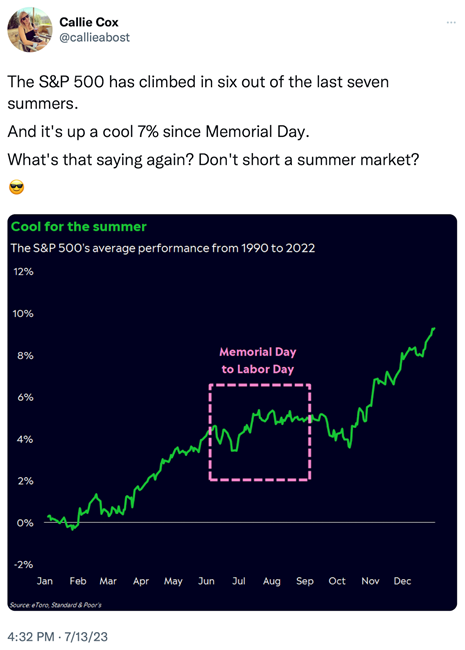US Stocks were mixed on Friday but traded solidly higher for the week. The markets rallied hard based on two upbeat June inflation reports released on Wednesday (CPI) and Thursday (PPI).
We spent a fair amount of time in last week’s Market Outlook addressing the reasons that we thought inflation would surprise to the downside. We used charts and graphs prepared by Fisher Investments and showed compelling reasons why the inflation numbers were likely to come in way below expectations. If you did not yet have a chance to read last week’s commentary, you may click here to reread or review the July 12, 2023 Market Outlook.
A significant drop in headline consumer inflation (we expected) drove the Consumer Price Index (CPI) to a two-year low and gave the markets a boost of energy on Wednesday.
Thursday morning the Producer Price Index (PPI) for June came in at 0.1% undershooting most economic guru’s expectations. Additionally, Labor Department data showed the number of American filing new claims for unemployment benefits unexpectedly fell last week.
This cooldown in inflation may give the Federal Reserve reason to ease up on its rate hike campaign and that, along with a falling dollar, gave investors a reason to cheer. However, we caution the euphoria as the CME futures rates shows most traders still see odds above 90% for an increase in July.
Pepsico (NASDAQ:PEP) and Delta Air Lines (NYSE:DAL) got the earnings season off to a good start on Thursday. Continuing with the banks on Friday, JP Morgan, Wells Fargo (NYSE:WFC) and Blackrock (NYSE:BLK) all beat expectations, but Citigroup (NYSE:C) had mixed results.
Nonetheless, the S&P 500 rose 2.5% for the week and the tech-heavy Nasdaq 100 (QQQ) jumped more than 3%. The cooler June inflation reports most likely altered future expectations with investors now pricing in just one more interest rate hike from the Federal Reserve this year.
Friday’s mixed market results were negatively influenced by Fed Governor Waller who came out Friday morning suggesting he, and other Fed Governors, were still looking for two (2) more rate hikes this year.
Some areas of the market are making new highs.
I am amazed at how much I am still reading about the narrow breadth of the market and the heavy influence of just a few stocks. While this has been true during most of 2023, the number of S&P stocks that are above their 50- and 200-day moving averages continues to grow indicating that this is a much healthier and robust market than many suggest. See charts below.
(These are unique MarketGauge charts that show the # of stocks expanding or contracting above their respective moving averages. The expanding blue area on a positive slope is considered positive for investing in this market segment. When this slope breaks and begins to decline for more than a few days, it is time to get cautious. We will have these and other market indices available weekly in our upcoming launch of MarketGauge Pro)
# of Stocks in the S&P 500 above their 50 Day Moving Averages
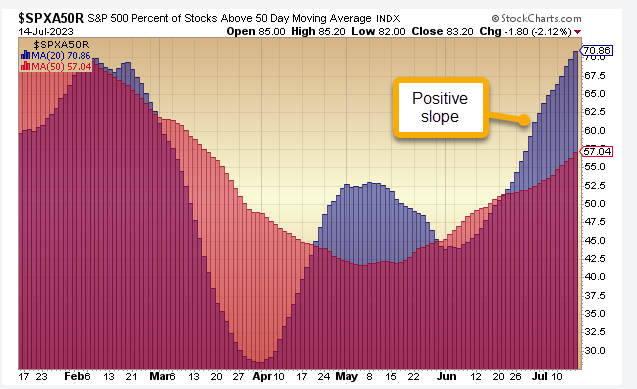
# of Stocks in the S&P 500 above their 200 Day Moving Averages
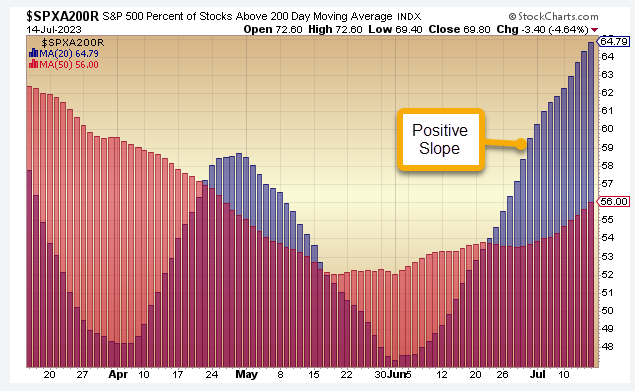
A note of caution above. The number of stocks above the 200 slope is going straight up and may be indicating a stretched market beginning.
Along with the algorithms we run and constantly monitor for Alpha Rotation and other S&P 500 trading systems, at MarketGauge we have a good handle on the “temperature” of the stock markets, and our strategies/models can and will adapt quickly.
Speaking of signs that the market is far healthier than many investors believe (especially short sellers who have been trounced this year), we offer the following:
The engine of our economy includes these important sectors: Technology, Semiconductors, and Home Builders. All 3 of these sectors just hit new highs. We believe this is a major positive for the markets. See below:
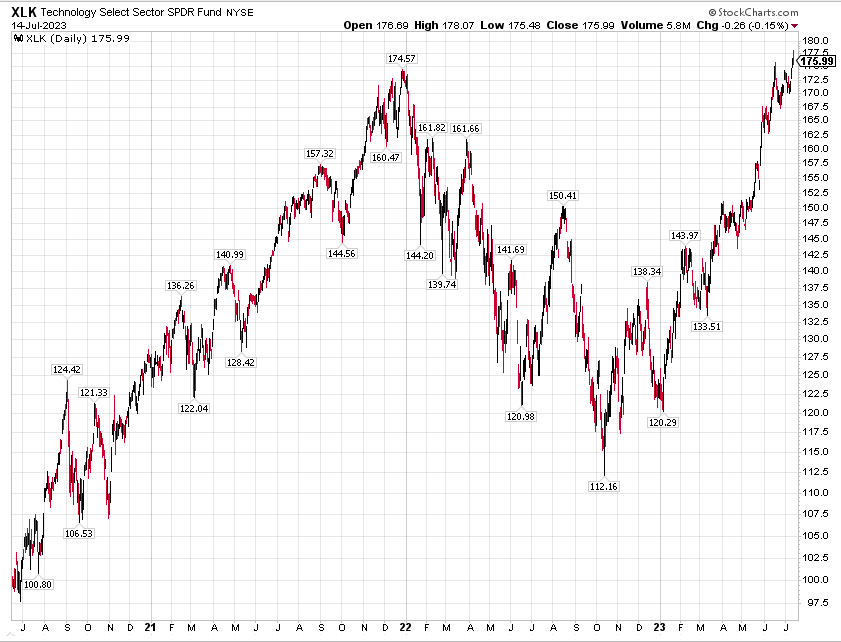
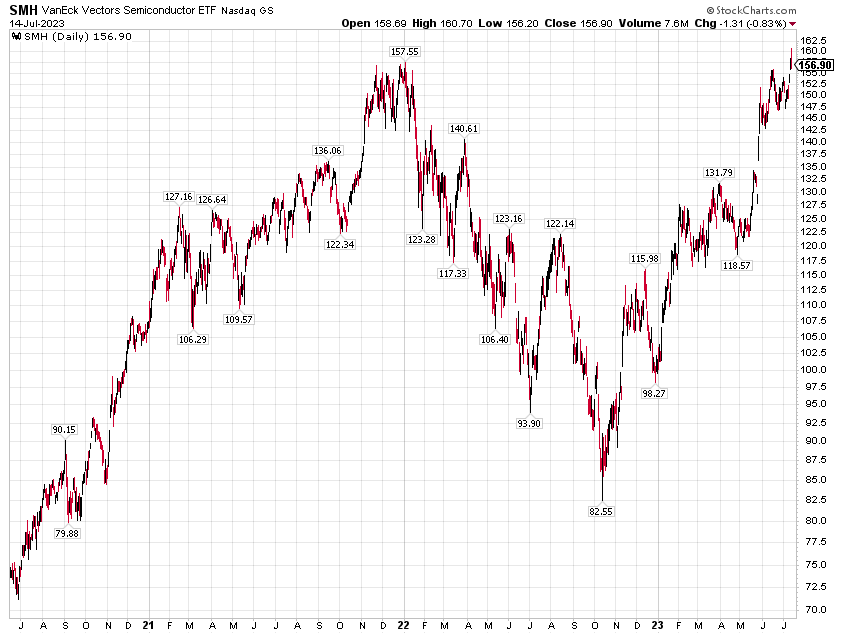
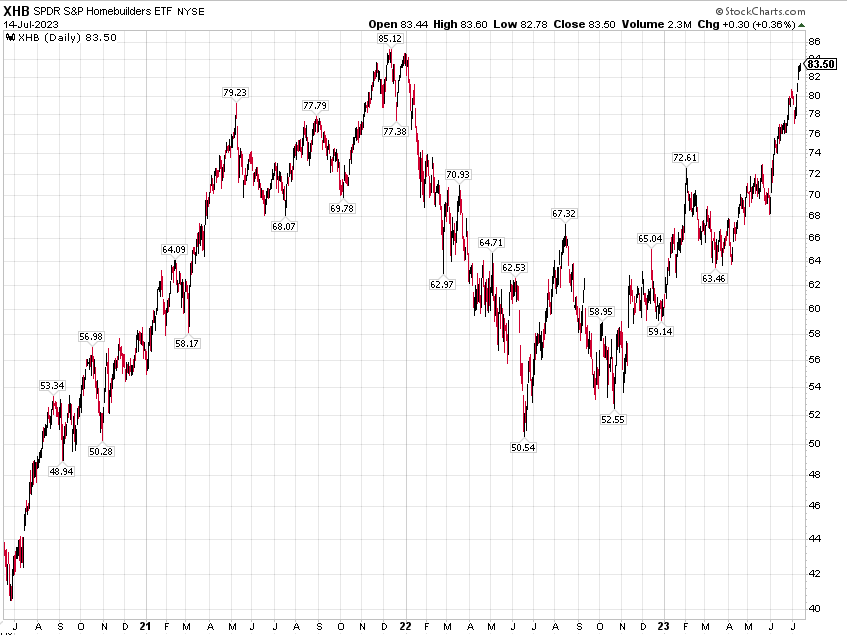
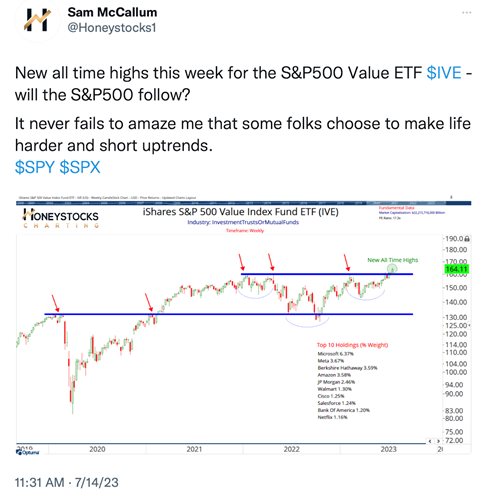
The industrial sector, a major component of our economy, has broken out to new highs as well. See below.
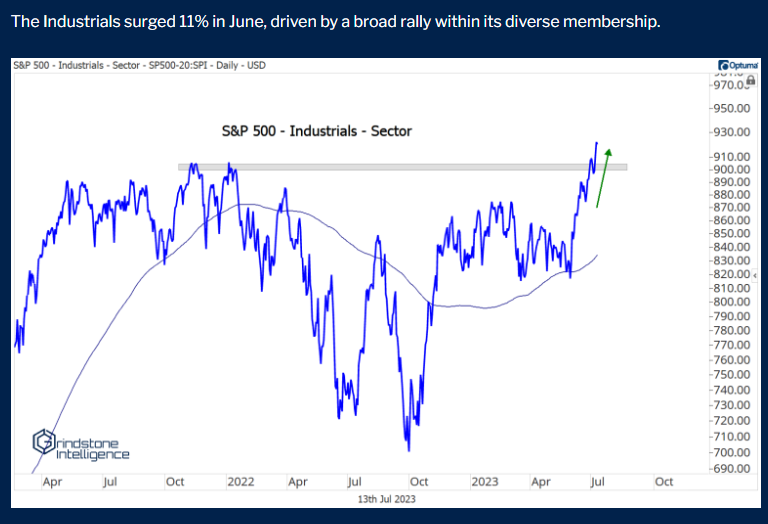
Investor Sentiment has recently turned positive. We have been addressing this in detail in most of the Market Outlooks in 2023. This is proof that investors are willing to take more risk and are deploying assets into more aggressive investment strategies.
Part of this is the FOMO (Fear of Missing Out) crowd who feels that they better get “into the action”. This also helped fuel the rise in the Big 7 stocks earlier in the year, as these same investors bought the biggest mega cap stocks as they deployed capital and got more invested. See the investor sentiment chart below.
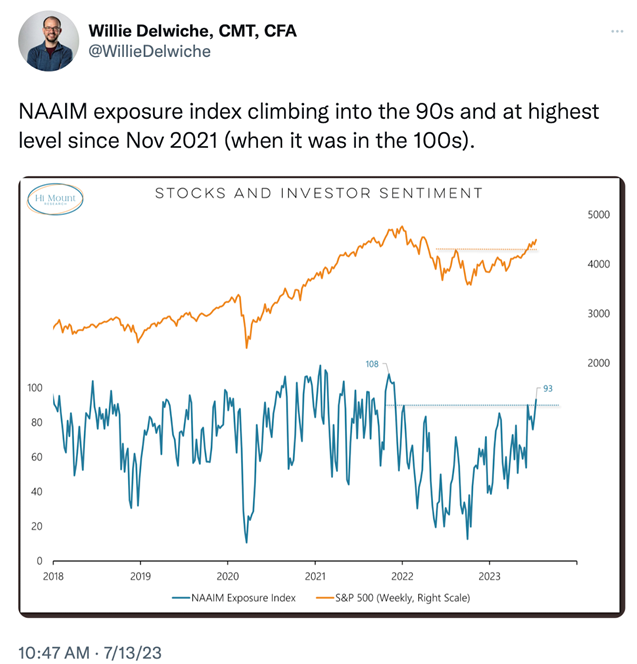
As Investor Sentiment has been improving, money market funds have been seeing outflows. Stock funds and stock ETFs continue to see inflows. This is certainly aided the markets in marching higher. See two different charts below that address this:
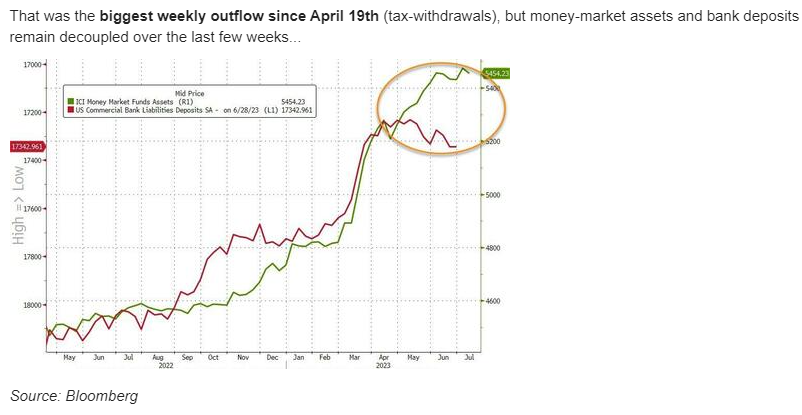
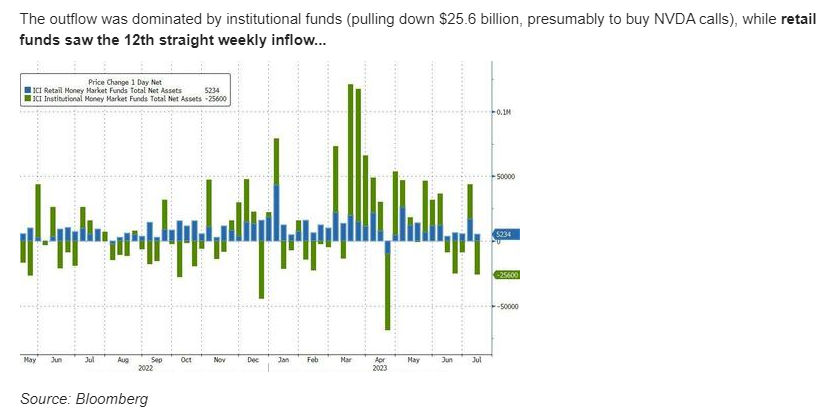
In turn, active equity managers who were sitting on larger than usual cash allocations as a defensive measure for their clients, have gotten more fully invested. See below:
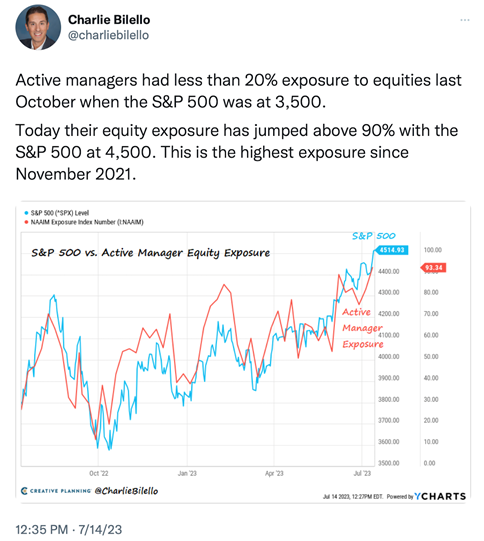
The US Dollar decline is beginning to provide a “tailwind” for US equities. Last year, given the swift rise in interest rates, stocks sold off. The strength in the $ was viewed as unfavorable for US corporations, especially those with international exposure. Surely it would cost more to do business worldwide with a stronger US Dollar. Most of this was driven by the Fed’s actions to raise rates quickly to curb the “hot US economy” and slow down inflation.
With the potential end of interest rate hikes in the near future coupled with plans by our Government to let the dollar decline to aid international trade, (including Oil), the dollar has begun a swift descent. See graph below:
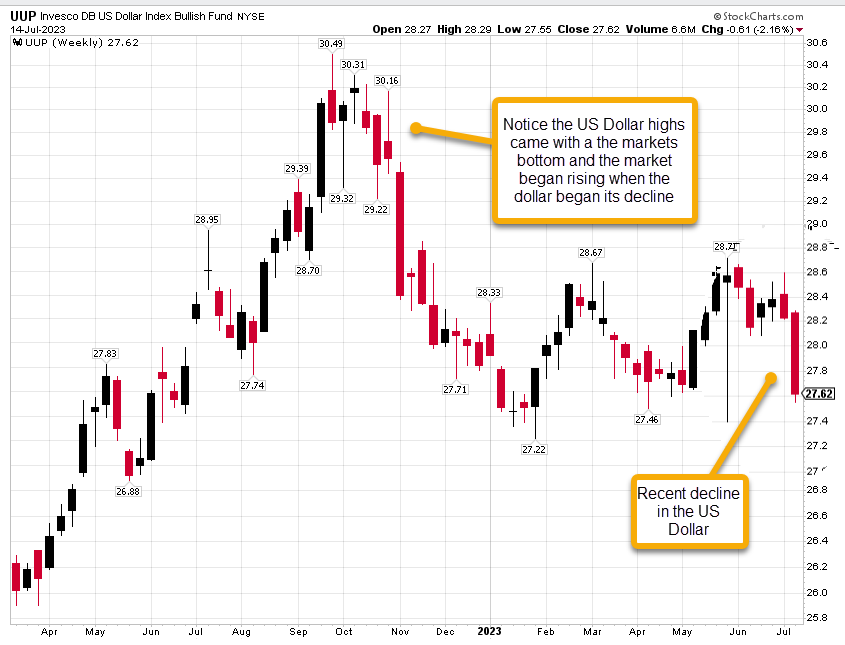
Here is a longer-term view of the US Dollar from LPL Research. You can see that the LPL chart below indicates a sell signal on the DXY (US Dollar Index).
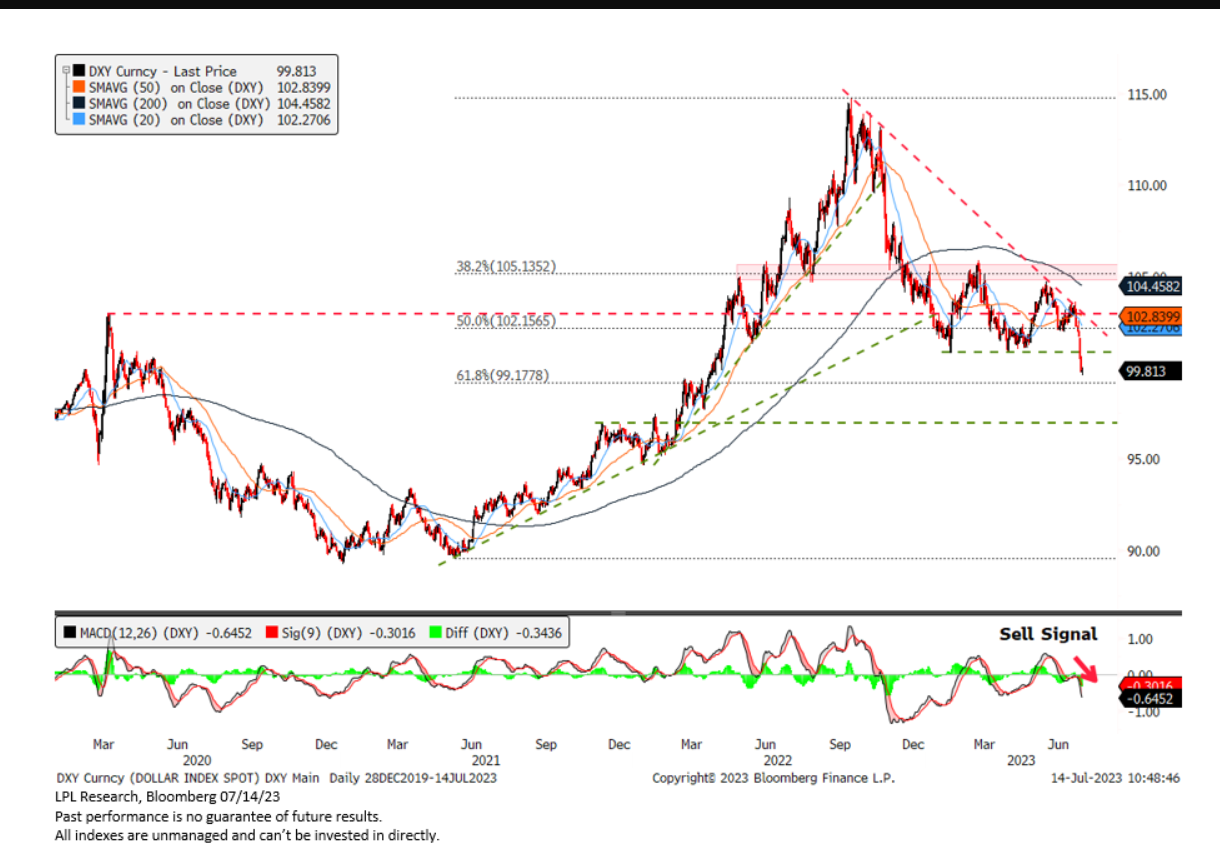
The potential drop in the US Dollar should help US Stocks, International Stocks (as their currencies get stronger against the US $), emerging markets and commodities. Look at the movement of SILVER (SLV) this past week as the US Dollar began to slide:
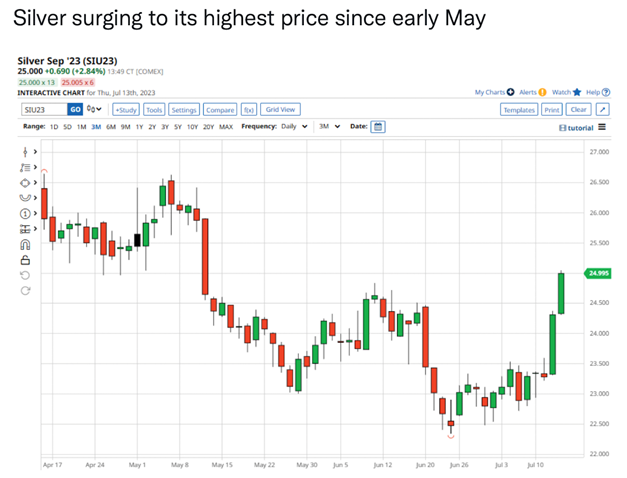
Here are some other asset classes that have a lower correlation to the US Dollar and will likely benefit should the dollar decline further:
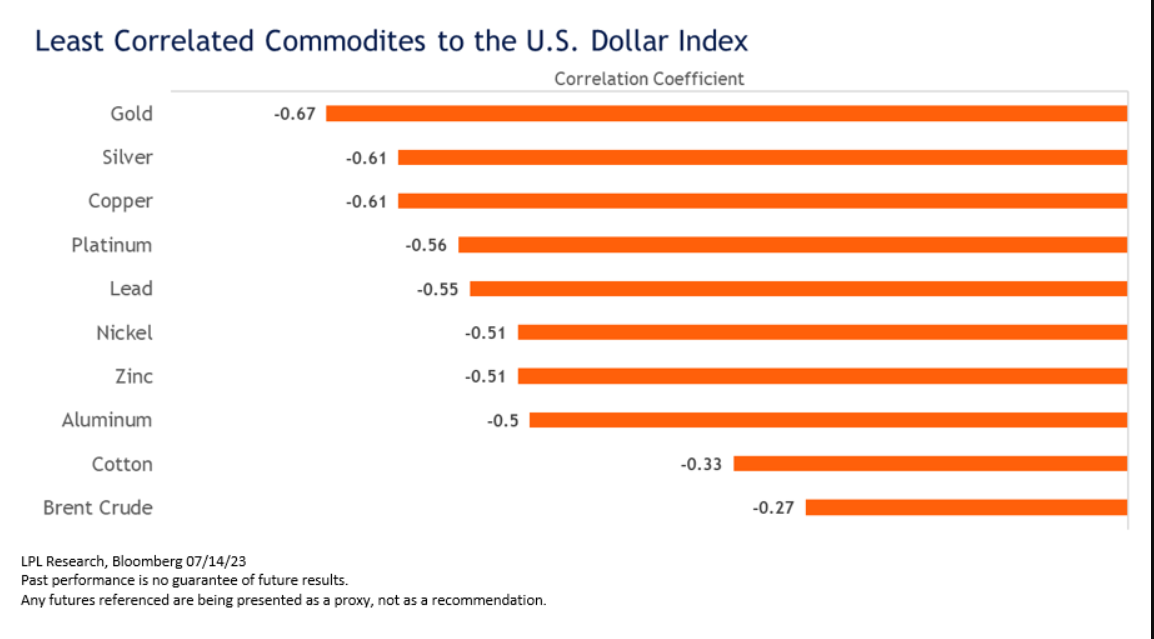
The above rhetoric would suggest that we are overly bullish and are suggesting that if you are not already invested in the markets, you do so now. NOTHING COULD BE FURTHER FROM THE TRUTH!
At MarketGauge, we DO NOT make market calls. We are not and do not want to hold ourselves to being market prognosticators. Instead we provide the gauges and the tools to let you know what you can do to put the investing odds in your favor and increase the chance of a profitable outcome.
We follow our investment strategies, model signals and proprietary All-Weather portfolio blends. These all utilize the S.M.A.R.T. investment methodology (SIM). These are formulaic and quant strategies that follow the discipline of strict rules-based investing. For example, before any of our investment strategies get invested in a position, we know at least two things: The first is the STOP PRICE where we intend to take from 50% to 100% of a position off, if the investment declines.
The second, and just as important piece of the puzzle is the PROFIT TARGET. The rules/algos always know in advance where we plan on taking profits off of the position to LOCK IN GAINS. The best example of how and why this works is using CCL (Carnival (NYSE:CCL) Cruise Lines) stock which we have owned since the latter part of June. By-the-way, if you have not read last week’s column on why CCL was the hottest stock in the S&P 500 last month, please click on the article here again.
See the chart below on how our rules-based, formulaic investing works and why these active strategies benefit you, the investor:
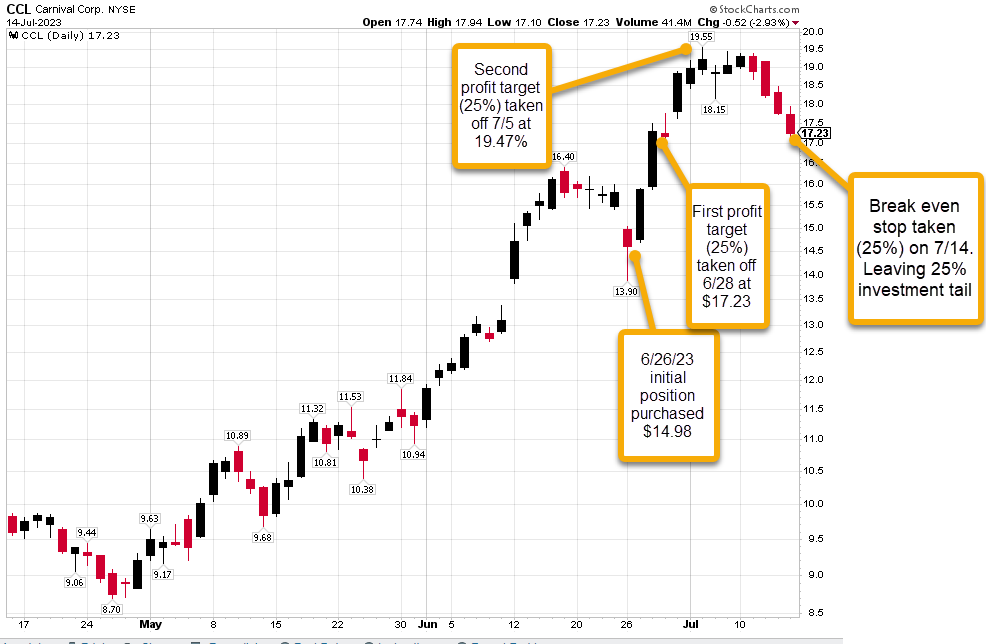

This investment position in our Large Cap Leaders has thus far contributed to 2.7% to the strategy’s overall performance since June 26, 2023. That is barely three weeks. Plus, those who follow this strategy and are diligent about taking the profit targets off, know how good it feels to lock in a profit, In the case of CCL, we took two profits then watched it decline while we were less exposed to the winning stock.
If you cannot or do not want to do this yourself, please contact me (Donn@MGAMLLC.com) and we can determine if you are eligible to have a managed account where we can execute the trades for you.
Why do we remain cautious? Earnings, Market Internals and Economic Activity.
In brief, we believe that Earnings may surprise this quarter to the downside. Analysts are expecting a reduction in the S&P earnings of approximately 7%. This will be the first quarter that could show a significant slowdown in corporate earnings, as well as top line revenue and margins. This could take some of the steam out of the market’s momentum.
Additionally, according to our wise and knowledgeable friend Jeff Hugh, CMT of Alpha Insights (see www.jwhinvestments.com), the markets have recently seen far more inside sellers than inside buyers. According to Jeff, right now the big companies are seeing as many sellers of their own stocks as they were in January 2022 when the bear market of 2022 began.
With Jeff’s permission (a highly reputable Chartered Market Technician-there are not many of these guys) shared with us two key graphs that give him pause as to if the markets can continue marching higher. (I highly recommend you follow Jeff on Twitter @AlphaInsights or reach out to him for additional information on his services. He is the real deal). See the chart below on the market beginning to lose momentum as it gets stretched and overextended:
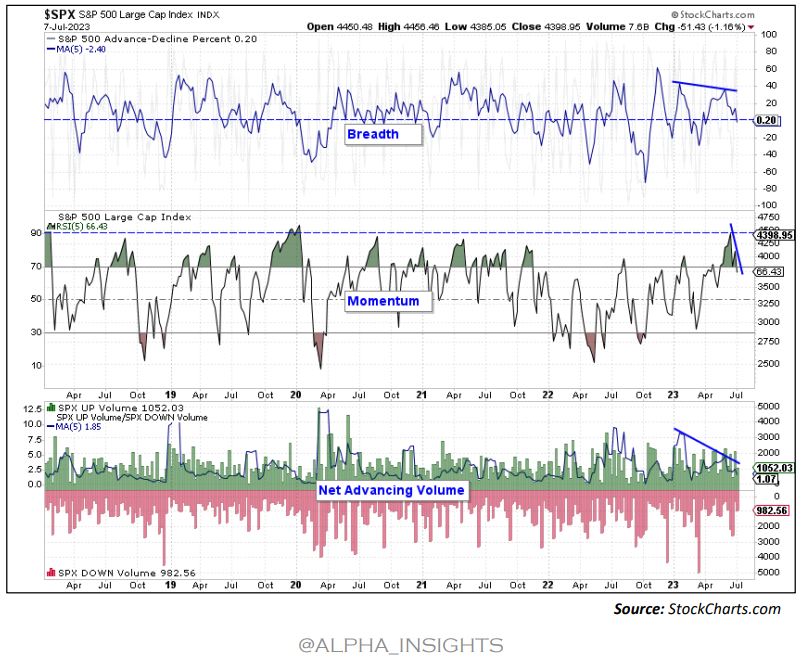
Additionally, Jeff points out, economic activity is slowing quite dramatically. See chart below:
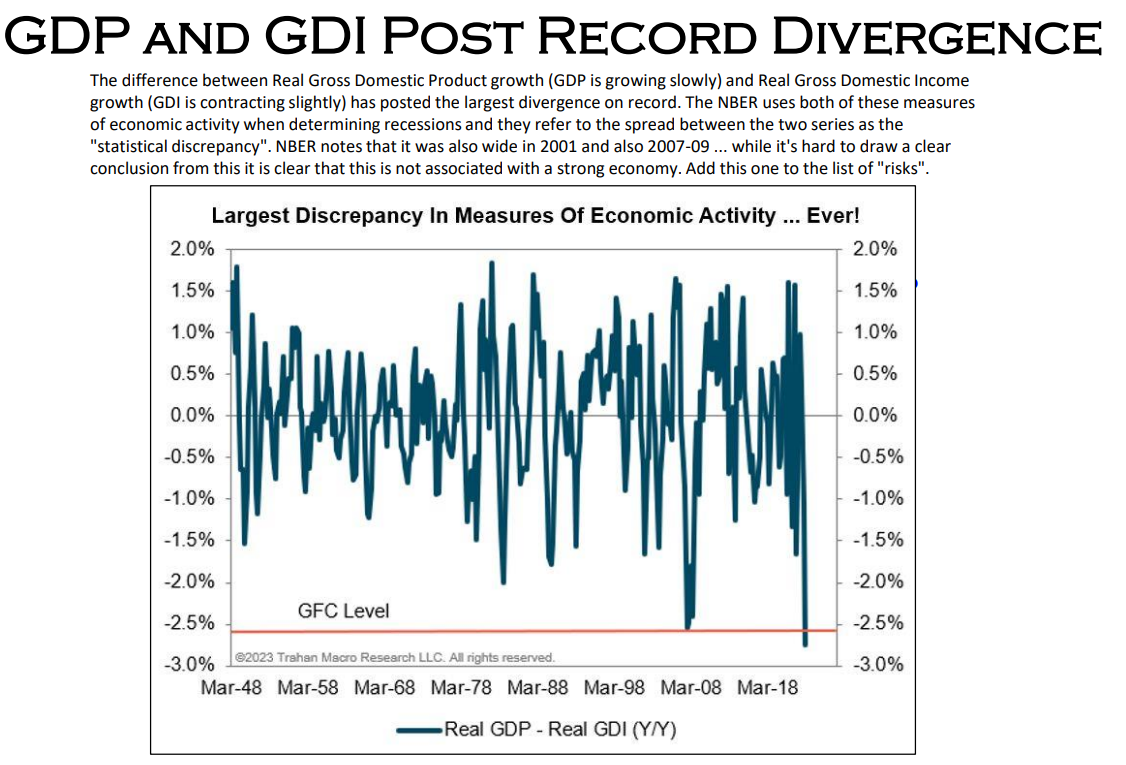
We are at resistance. This may give this market a pause as it digests recent gains and determines if it wants to move higher? See chart below:
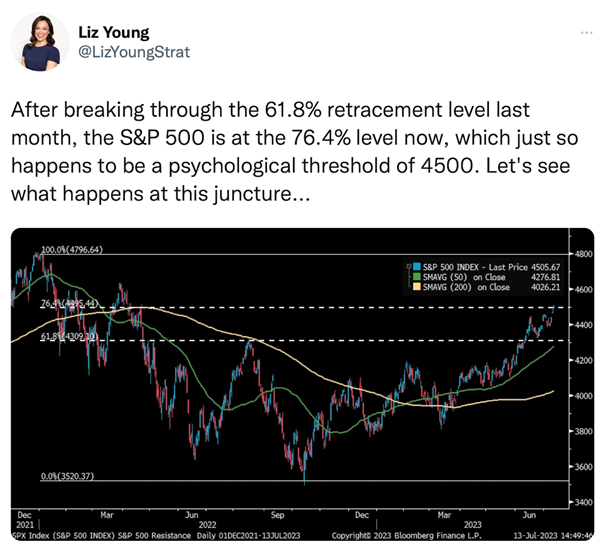
The market is showing signs of being overextended. The CNN Business Fear and Greed indicator is made up of 7 sub inputs. These range from momentum to stock strength, breadth, volatility, junk bond demand and other important variables. Right now the gauge is showing extreme greed. See below:
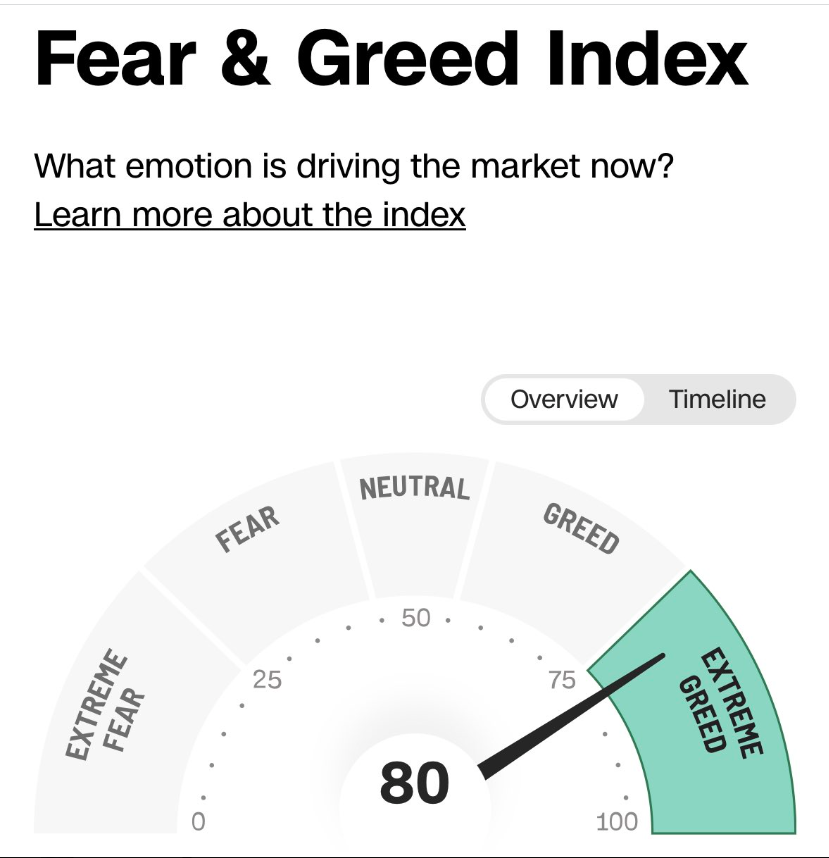
One of the indicators that I have watched through the years is the Put/Call ratio. Right now it is also showing extreme greed as very few investors are buying insurance for their portfolios. This is a contrarian indicator and when the indicator gets to an extreme (such as now) that signals a potential turning point or correction. See chart below:
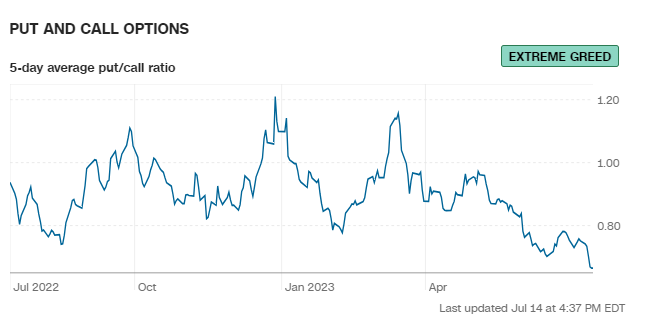
One last thought. Be careful getting too negative. The stock market can go up even in the face of slowing economic activity and higher interest rates. Investors must remember that we are in a PRE-ELECTION year. Historical the 3rd year of a Presidential cycle is a positive time to be invested in the stock market. See chart below:
